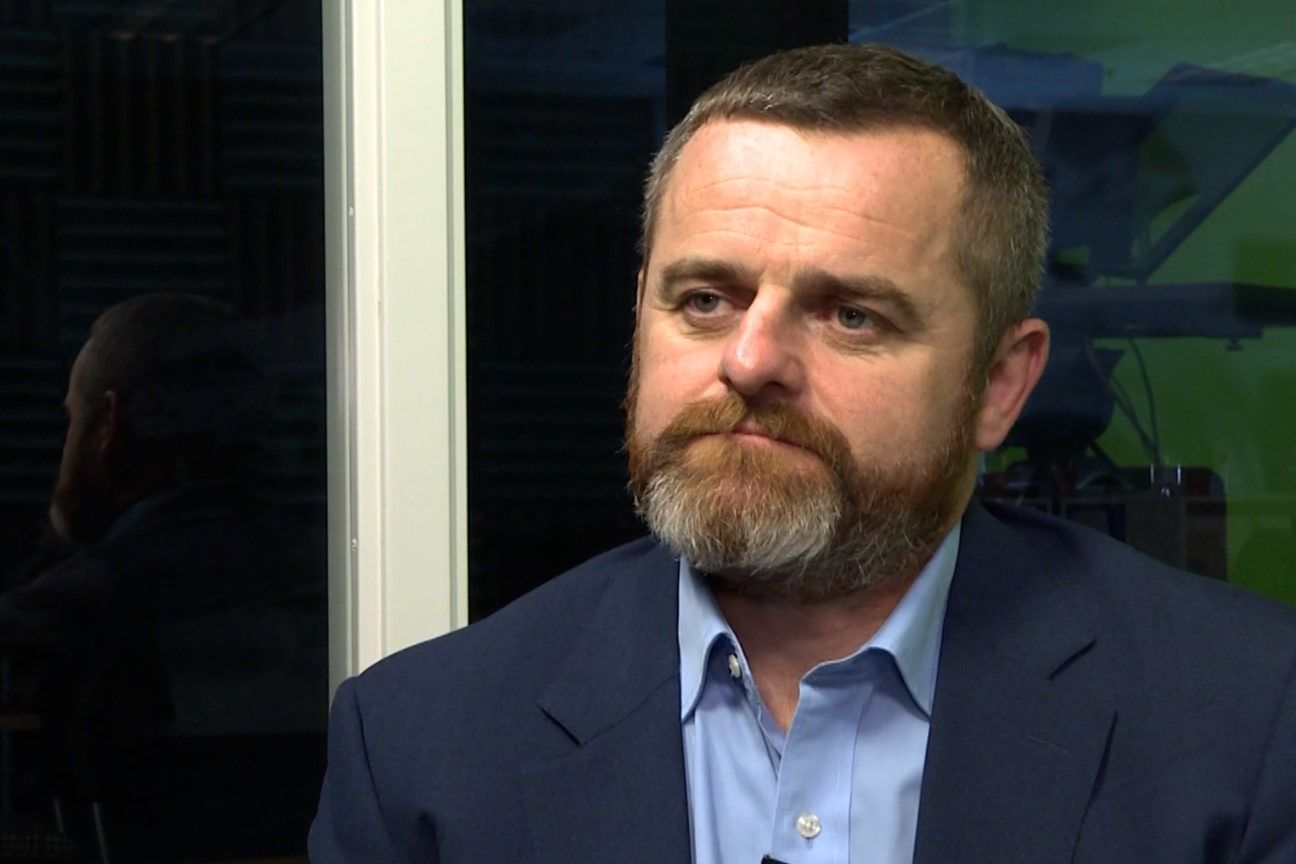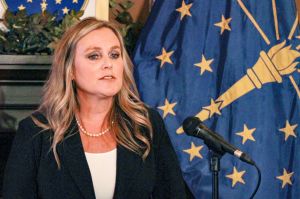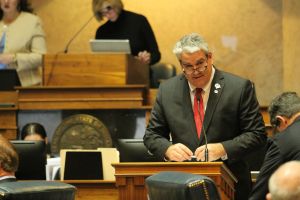
Aonghus Kelly is helping Ukraine’s government investigate war crimes. (Devan Ridgway, WTIU)
A visiting fellow at IU met with students this week to describe his work as head of the European Union’s International Crimes Unit in Ukraine.
In other words, Aonghus Kelly is helping Ukraine’s government investigate war crimes.
Kelly has lived in Kyiv, Ukraine, since Russia invaded in 2022, and his war crimes work has taken him to Bosnia, Cambodia and Iraq.
WFIU-WTIU News interviewed Kelly about his role.
This interview has been edited for conciseness.
Sandweiss: So, you're currently investigating potential war crimes committed by Russia in Ukraine?
Kelly: No, it would be great to say. We're advising the Ukrainian authorities who are investigating and prosecuting cases of international crimes, but also working with the defense bar and also working with the judiciary in the area of international crimes, what's commonly known as war crimes.
Unfortunately, there's been conflict-related sexual violence, there have been cases of torture, there’s been cases of murder, there’s been cases of illegal detention. So, there’s unfortunately a vast array of crimes for our Ukrainian colleagues to investigate and prosecute. We’re working with them as best we can, at their direction if you will.
Sandweiss: If these crimes are taken to court, they’d be taken to court in Ukraine rather than an international court?
Kelly: That's for the Ukrainian authorities and the International Criminal Court, or if there's discussions about a special tribunal for the crime of aggression, that's for the authorities relevant to those three institutions to decide. But obviously the most important thing is that they be investigated to the highest possible standards, so they can be utilized in the best possible manner to seek justice and accountability.
Sandweiss: Could you talk a little about your job? How do you prepare a country to start these kinds of trials?
Kelly: I've worked in Bosnia, and Kosovo, and Cambodia. I've worked on cases in Iraq and in other places. And I think the most important thing is to be humble, and to go there with an open mind and to see what needs to be done, how it can be done, and to seek knowledge from local actors as to what they really need. There’s no point of coming in some kind of imperial manner and saying, “We know everything. We’ll tell you what to do.”
Every context is different. What works in the Ukrainian system is paramount because that is Ukraine's sovereign duty, but also Ukraine's burden to deal with these crimes.
Sandweiss: It is unusual to start the process of a war crimes tribunal while the conflict is still going on, right?
Kelly: It is unusual that a conflict is investigated while it's ongoing. There's no doubt about it. It's not unprecedented. It did take place to a degree, during the conflicts in the Balkans, particularly in Bosnia, between ‘92 and ‘95. The International Criminal Tribunal for the Former Yugoslavia was set up at that time. So yes, to a degree it is very unusual, but not unprecedented.
Sandweiss: War crimes tribunals — thinking about the Nuremberg trials, or trials in Rwanda after the genocide, or in Cambodia — usually can't take place until the power that's been committing the atrocities has been defeated. Russia is a global power. What are the chances that any of these people are going to stand trial?
Kelly: That's kind of crystal-ball gazing to a degree. But the reality is that terrible things have happened, and it is incumbent on the authorities to investigate those terrible things, and it should be incumbent upon us in the international community to assist the authorities in in doing their jobs as best as they can. Whether those trials take place in Ukraine, or in a tribunal, or the International Criminal Court, there is no ability to go back in time. Therefore, undertaking the best possible investigations at the present time is really, really crucial.
Sandweiss: This kind of war looks different from what happened in former Yugoslavia. This is a war that has drones, where cyber-attacks have become much more common, where both sides are using long-range missiles to strike each other. Does that mean that the war crimes look different as well?
Kelly: It's a very legal answer, I suppose, to say it depends. In some ways they look very different, in other ways they look very similar. Man’s inhumanity to his or her fellow mankind is not new to us. The Ukrainian authorities have a very, very difficult job. But that's why we're there, to try and help them with that very difficult job.
Sandweiss: Even in conflicts where one side consistently is displaying worse behavior, sometimes crimes are committed by the side that generally enjoys more public support. If a Ukrainian unit or a Ukrainian soldier were suspected of committing these crimes, might there be a similar investigation?
Kelly: The Ukrainian authorities have very firmly outlined that that is their wish and that is their practice, to investigate those instances. So, I would suggest that has already taken place, evidently, based on what they've said very publicly and very firmly.
Sandweiss: I want to talk more about war crimes proceedings in general. You've been on the prosecutor's side for a lot of these cases, but you've also had the experience in Cambodia being on the defense side. How do you manage doing that in a war crimes case?
Kelly: Legally, you're there to uphold the law. Thankfully, in the instances you’re mentioning and in the countries that we live in, it rightfully points out the importance of there being a proper process: investigation, prosecution, but also a right to a proper defense. Otherwise, you slide that slippery slope very quickly.
The other thing is, I'm from Ireland, and in our system it's quite unusual compared to many jurisdictions in that crossing between the prosecution and defense for lawyers is very normal. That does lend a different sheen, I suppose, to my perspective.
Sandweiss: Ukraine and Russia have a very long history, and there's been a lot of acrimony. Do you think those feelings or the kind of rhetoric about Ukraine in Russia and vice versa has in some way made this conflict more prone to war crimes?
Kelly: The honest answer is I don’t know. You could theorize that that's the case, there would be a logic to that. I certainly think that the portrayal by the Russian Federation of Ukraine is incredibly flawed and doesn't tie in with anything I see on the ground in Ukraine.
Inflammatory rhetoric is never a good idea in any conflict or indeed post-conflict situation. I know that very well from my own home country, where we had a conflict that only ended in 1998 and yet the discussion about that continues to this day, and it can be very inflammatory.
So as a lawyer, you try to stick to the law. The politics, of course, goes on behind you. But you try.
Sandweiss: On your visit to IU, you watched 20 Days in Mariupol for the first time. You're somebody who's been steeped in this stuff every day. What was your reaction to seeing that movie?
(20 Days in Mariupol is a documentary about Russia’s siege of the Ukrainian city. The film won best documentary at Sundance and the Academy Awards)
Kelly: It’s a very affecting film. Obviously, you're aware of all these terrible things going on, but to see it presented to you in pictures and words is much more powerful.
Unfortunately, I wasn't surprised. As I mentioned, I've had the good fortune to visit and live in many places that have had troubles and met many incredibly brave people. I find that very inspiring, because sometimes you can be troubled by the things you read, or by dealing with the bureaucracy of any job, but compared to the suffering that these people are going through, this is not even minuscule. It's unmeasurably small compared to what these people are going through.
I will leave Ukraine and move home to Ireland or move somewhere else, but the people of Ukraine will live there for the rest of their days and have to deal with the effect on their culture, on their being, on their society for decades to come.
Sandweiss: There are some things that justice and a court can’t fix.
Kelly: There are many things, unfortunately. I think sometimes the expectations we have for courts are far too large. Courts are places for looking at alleged criminal acts and seeing if culpability can be assigned. They're not the all-singing, all-dancing solution to problems.
(All-singing, all-dancing is a British idiom meaning “full of vitality” or having many features)
I have an awful lot of faith that they will get through this and they will bring the country to a better place, but it's deeply troubled at the moment, and that's the reality for them all.
Sandweiss: What makes someone commit a war crime? Surely there are people who commit war crimes who we would not consider a monster just meeting them, based on first impressions.
Kelly: War does terrible things to people. It creates a space for things that would never be allowed in peacetime. And I suppose our job, when one works in such situations, is to bring society back to where it should be.
I met several of them when I was in Sarajevo. This is not Jeffrey Dahmer or some sort of serial killer you're meeting. They're very normal people most of the time. So, it's just that war often does terrible things to people and puts people in terrible situations.
Sandweiss: Even a war that is carried out the way it is “supposed to” still carries immense destruction.
Kelly: War is a terrible place not just for the people, also for the environment. You're seeing enormous swathes of land destroyed, forests destroyed, natural habitats destroyed. Ukraine has enormous variety of habitats, of forests, of marshes, of river deltas, of steppe, and that's being destroyed daily by the invasion. That’s damaging not just for present day Ukraine, but also the future of Ukraine.
The massive scale of destruction of Ukraine is almost unquantifiable, to be honest. It's so, so vast.
Sandweiss: Can crimes against the environment during war be investigated as war crimes?
Kelly: They can. Our Ukrainian colleagues are doing a lot of work in this space, and we're trying to assist them in that regard. They have a very difficult, tough task, but they're certainly pushing forward with gusto.
It's a new area to many. There’s not much case law on this. So, they're the pen holder, if you will, for the ability for future generations to deal with these topics more concretely and fully.
Sandweiss: Is there anything else you feel like it’s important for people to know about war crimes investigations and prosecution in Ukraine?
Kelly: I suppose it's important that we all continue to support our colleagues in Ukraine, given their enormous task. More generally, in these troubled days I think it's important that we keep in mind that at the end of the day, what's happening here involves human beings.
Looking out for your fellow humankind, should be kind of the basis of all of our actions, I would humbly suggest.











